#brihad-aranyaka upanishad
Photo
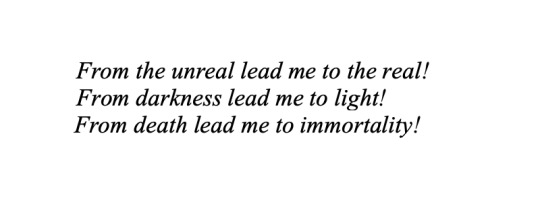
Yajnavalkya, Brihad-aranyaka Upanishad
549 notes
·
View notes
Text
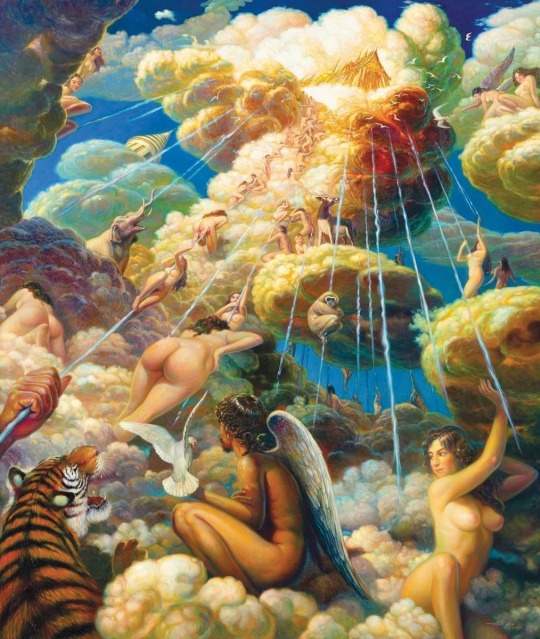
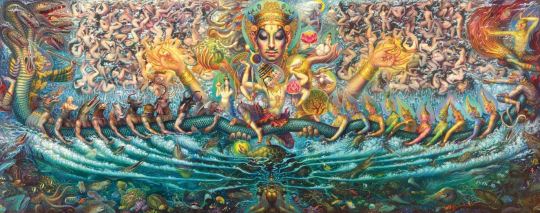
“when all desires that lodged in the heart are let go, the mortal becomes immortal and reaches the Eternal.”
--Brihad Aranyaka Upanishad
Way to Heaven by Prateep Kochabu
Churning of the Milk Ocean
by Prateep Kochabu
85 notes
·
View notes
Text
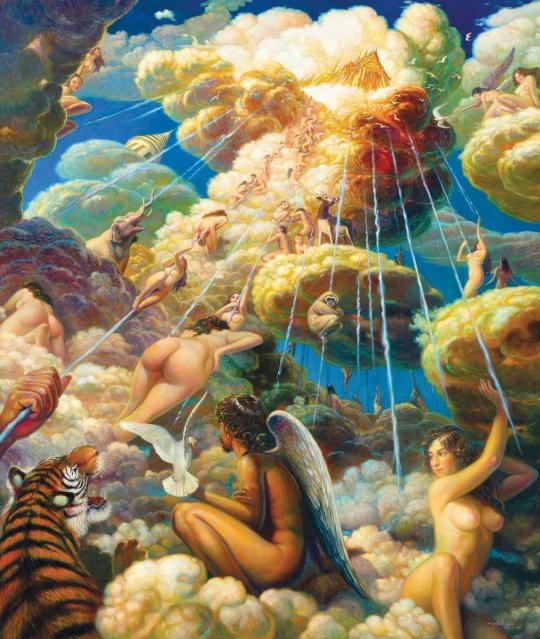
Way to Heaven
by Prateep Kochabu
“when all desires that lodged in the heart are let go,
the mortal becomes immortal and reaches the Eternal.”
- Brihad Aranyaka Upanishad
50 notes
·
View notes
Text

De onde veio a meditação?
A meditação originou-se na Índia, há muito tempo. A evidência documentada mais antiga da prática da meditação são as artes de parede no subcontinente indiano de aproximadamente 5.000 a 3.500 aC, mostrando pessoas sentadas em posturas meditativas com os olhos semicerrados.
A mais antiga menção escrita de meditação é de 1.500 aC nos Vedas. Essa é a época em que os Vedas chegaram ao papel, mas deve-se entender que os Vedas foram memorizados e transmitidos como uma tradição oral por séculos, muito antes de serem finalmente escritos. De fato, o Brihad Aranyaka Upanishad (século XIV aC) lista quase 70 gerações de gurus e estudantes de meditação que existiram até aquele momento.
Durante este tempo antigo, a meditação era uma prática para pessoas religiosas e ascetas errantes, que através dela buscavam transcender as limitações da vida humana, conectar-se com forças universais (personificadas como divindades) e união com a realidade transcendental (chamada Brahman nos Vedas ).
A tradição hindu de meditação inclui tanto os iogues meditando em cavernas, quanto os sábios ( rishis ) da cultura védica. É a tradição de meditação mais antiga da Terra – ainda viva e próspera. Tem centenas de linhagens e técnicas .
Muito provavelmente, a primeira técnica de meditação a ser inventada/descoberta foi a meditação com mantras ou a contemplação, embora não possamos saber com certeza.
O movimento Yoga moderno, que enfatiza posturas e exercícios respiratórios, é uma adaptação de apenas uma dessas centenas de escolas de Yoga (a escola Hatha Yoga). Em geral, o Yoga é uma tradição de sabedoria cujo núcleo é a meditação e o desenvolvimento espiritual, não um sistema de alongamentos e práticas de respiração.
Boa noite! Lucas Lima
0 notes
Text
MYSTERIES OF DIVINE DREAMS
MYSTERIES OF DIVINE DREAMS
QUESTIONS FROM DIFFERENT COUNTRIES ABOUT DIVINE DREAMS AND THEIR YOGIC INTERPRETATIONS
15.1.20
Priya Lohia
Why do I see God many times (i.e. idols) in my dream?
Firstly, one conception should be clarified. So let me quote a hymn from Brihad Aranyaka Upanishad as such:
This that people say, “Worship this god! Worship that god! One god after another – this is his creation indeed! And he…
View On WordPress
0 notes
Text
“All in all, my view is that the corpus callosum does act principally as the agent of hemisphere differentiation rather than integration, though ultimately differentiation may be in the service of integration. This complex, almost paradoxical, function at the very core of the brain, forming a bridge that nonetheless separates the worlds of the hemispheres, is captured with extraordinary prescience in one of the verses of the Hindu spiritual treatise The Upanishads: ‘In the space within the heart lies the controller of all … He is the bridge that serves as the boundary to keep the different worlds apart.’”
— Iain McGilchrist, The Master and his Emmissary, reference is to the Brihad Aranyaka Upanishad.
2 notes
·
View notes
Text
From 2009 through 2016, I took part in a series of great books seminars. We met on Sundays.
Here is how seminar works, mostly, in the sense that I mean it: there is an opening question, a reading list, a table and chairs, a great book, no food. It meets regularly about once or twice a week.
The opening question should be an honest question for whoever asks, as well as for the rest of the seminar and for the author of the text. Often, a good opening question is one which the text seems to ask of itself. For example, in Sophocles's play, Ajax asks "What joy can be in day that follows day, Bringing us close then snatching us from death?" In the seminar in which this question was asked, it developed that Odysseus moves side-to-side, while Ajax moves forward and backward. This metaphor then formed the basis of our investigation.
The opening question is by no means the only question to be addressed, and many a great seminar veers immediately away from the opening question, never to return. Yet, the seminar accepts the opening question as a a valid question, and it is understood that we rely on the space which this question creates. Even a "bad" opening question still creates a space.
A reading list is especially helpful when there is a large power disparity among the members, either institutional, intellectual, social, or what-have-you. By removing the choice of what to read next, the reading list removes one of the primary active mechanisms of control. A seminar with a lopsided power dynamic, willing members, and without a reading list may very likely turn into a guru-type situation. In a setting in which not all of the participants are willing, as in school, without a reading list some of the people may try to use the choice of what to read next as a way to exert control and escape their imprisonment. This is entirely to be expected; the student has made a wise choice. If such a seminar is to persist, a reading list may be necessary. In the Sunday seminars we were largely unaware of such power disparities, so we often just decided each week what to read the next. A seminar without a previously agreed reading list is sometimes called a "guerrilla seminar".
The participants should try to finish the reading. This is not always possible; sometimes, a seminar assigns itself something like 300 pages of Tacitus. But what is it to read, and what is it to "finish" a reading? A person who reads only "What joy can be in day that follows day, Bringing us close then snatching us from death?", or reads only "With the fundamental mood of anxiety we have arrived at that occurrence in human existence in which the nothing is revealed and from which it must be interrogated. How is it with the nothing?", or reads only "The valley spirit never dies; It is the woman, primal mother. Her gateway is the root of heaven and Earth.", and who really reads those tiny fragments, has read far more and better than one who wastes a lifetime staring at words without feeling.
The table functions as a table, but also as a material object separating the participants, hiding their bodies and connecting them by means of a flat and empty space. This is not strictly necessary but it can be a great source of comfort. The table should not have a hole in the middle of it. It should not be a ring of smaller tables. Ideally it should be a nice table, but this is not always practical. A few wooden tables pushed together does well.
The chairs should be comfortable. Many people habitually lean back or forward in their chairs during seminar, and this behavior should be accommodated as far as possible by the chairbler.
A great book is a book on which a great seminar can be had (and a great seminar is one which can address a great book). Such books are abundant, but some care is generally advisable in selecting a text. A great book can accept any question, no matter how small, large, irrelevant, or just plain stupid. This removes a lot of the pressure from the seminar participants. A great book is resilient, fecund, and immaculately coherent. In the ideal book, every element down to the etymology of each word is essential, irreplaceable, and interactive with every other element.
Seminar is a serious study. It is like being in a great library after hours. We listen to each other and speak our best, while yet recognizing that the spirit which moves us to speak is not always under our control. Eating at the table generally detracts from the study, as an ambiguous overlap develops with the much more common table-based social activity of meals. (Revelations 10:9, “And I went unto the angel, and said unto him, Give me the little book. And he said unto me, Take it, and eat it up; and it shall make thy belly bitter, but it shall be in thy mouth sweet as honey.”) A very hungry person could eat their lunch or dinner at the beginning of seminar, but they should apologize for their impropriety. Some people think it's sometimes a good idea to have seminar while drunk, but I have generally been underwhelmed by the contributions of drunk or otherwise intoxicated people. A seminar isn't a great place to have a party, but it can be loads of fun to have a party in which we have seminar, in the same way that people enjoy a party in which we play a sport.
There are some schools which claim to have seminar 5 days a week, but I don't see how that is possible for a group which is taking the project seriously. The Sunday seminars met once a week, while at St. John's College they meet twice a week.
While the underlying behaviors were largely learned from St. John's College in Santa Fe, NM and Annapolis, MD, the practice and the formulation of these ideas was developed in the Sunday Seminar itself with Lea Brock and other collaborators.
In the fall of 2016 other participants in the seminar needed to begin meeting in a place which made me uncomfortable. I expect one day again to take part in such work.
Here is a more-or-less complete list of books which we read:
2009
1/22
Rabelais - Gargantua and Pantagruel (Prologue-I5, I6-15,-28,-41,-58,II19)
2/26
Aristotle - Posterior Analytics (II19)
3/5
Kierkegaard - Fear and Trembling (Preface, Attune., Praise; Preamble; Problema I)
4/2
Nietzsche - Thus Spake Zarathustra (Prologue-6, -14, -22)
4/23 (this is when I joined the seminar)
Wittgenstein - Philosophical Investigations (Preface-20, -39, -60, -85, -120)
Summer 2009: ?
Dostoevsky - Notes from Underground
Baudelaire - "To the Reader", "The Enemy", "The Albatross"
10/4
Joyce - Portrait of the Artist as a Young Man (-2,-5)
11/1
Buber - I and Thou (I, II, III&PS)
11/22
Heidegger - What Is Metaphysics?
Heidegger - On the Essence of Truth
2010
1/10
Husserl - The Origin of Geometry
1/24
Wittgenstein - Philosophical Investigations (I -231,-463,-693,II)
2/28
Borges - Labyrinths (The Fictions, The Essays and The Parables)
3/7
Marquez - 100 Years of Solitude (-105,-207,-297,-422)
4/18
Trivers - On the Evolution of Reciprocal Altruism
4/25
Hearne - Adam's Task (-3,-6,-11)
Summer of 2010: Shakespeare's Henries and Richards, Dogen, ?
Aeschylus - Agamemnon
9/19
Aeschylus - Libation Bearers?, Eumenides
Kafka - The Penal Colony
Plutarch - Alcibiades
Plato - Phaedrus
10/31
Kierkegaard - Fear & Trembling (same divisions as in 2008)
12/5
Rig Veda - selections
2011
1/16
Upanishads - Brihad-Aranyaka and Katha, 4th Brahmana 1-17, and Valli 1-6 (one class)
Hemingway - The Old Man and the Sea
Kafka - A Hunger Artist
2/6
O'Connor - The Lame Shall Enter First
Chaucer - Nun's Priest's Tale
2/20
Dante - Inferno (4 seminars)
4/3
Euripides - Alcestis (SJC alumni seminar with Mr. Lecuyer)
Fukuoka - One Straw Revolution part 1&5
Trivers - On the Evolution of Reciprocal Altruism
5/1
Wordsworth - Tintern Abbey
Plato - Ion
5/15
Kafka - Before the Law
Summer of 2011: Tolstoy - War and Peace
8/7
O'Connor - Wise Blood (-6, -end)
8/21
Montaigne - On Repenting
Chesterton - Ethics of Elfland
9/11
Nagarjuna - Fundamental Wisdom of the Middle Way
Heidegger - What is Metaphysics?
9/25
Shakespeare - Othello (I&II, III-V)
Plato - Lysis
10/30
Sophocles - Philoctetes
Matthew 1-7
11/20
Euripides - Bacchae
12/4
Hesiod - Works and Days
Ecclesiastes
2012
Straus - Persecution and the Art of Writing
Klein - The Problem and the Art of Writing
1/29
Klein - History and the Liberal Arts
Melville - Benito Cereno (2 seminars half and half)
Tolstoy - Kreutzer Sonata
3/4
Kepler - excerpt (2 seminars)
Newton - (Definitions, Axioms, Corollary II, Book I & Lemma I&II)
4/22
Trivers - On the Evolution of Reciprocal Altruism
Hemingway - A Clean Well-Lighted Place, Fifty Grand
Baudelaire - The Abyss, A Carrion, The Mask
5/13
Pascal - Pensees (self-selections)
Summer 2012: Cervantes - Don Quixote
8/12
Euclid - Elements (I thru P24, -P48, II thru P6, II)
Kierkegaard - Philosophical Fragments I&II
9/16
Euclid - Elements (III -P20, III -end, IV)
Kierkegaard - Philosophical Fragments (all)
10/28
Euclid - Elements (V, VI -P16, VI -end)
Shakespeare - Midsummer Night's Dream
Dostoevsky - Bobok
12/2
Euclid - Elements VII
3 Poems - Millay's "Euclid Alone", Keats's "Ode", Hopkins's "Pied Beauty"
2013
Tolstoy - Hadji Murat (didn't happen)
2/3
Hopkins - 7 Poems (Lantern, Pied Beauty, Shocks of Wheat, Windhover, etc)
3/24
Nietzsche - Beyond Good & Evil (Preface and 1; 2; 3, 4; 5; 6; 7; 8; 9)
Summer 2013: Tolstoy - Anna Karenina
8/18
The Secret Book of John
Plato - Gorgias (-486e, -end)
9/8
Plutarch - Caesar
Plutarch - Brutus
Sophocles - Ajax
9/29
Hearne - How to Say Fetch
10/20
Faulkner - Go Down Moses, "The Bear"
Plato - Cratylus
Plato - Timaeus
11/10
Wilde - Picture of Dorian Grey (1st half, 2nd half)
Faulkner - "Pantaloon in Black"
2014
1/12
O'Connor - The Life you Save could be Your Own
O'Connor - Good Country People
Heidegger - Building Dwelling Thinking
2/2
Plato - Theaetetus (2 seminars)
Plato - Protagoras
Plato - Parmenides
3/9
Tolstoy - Father Sergius
Beckett - Waiting for Godot
Pascal - Generation of Conic Sections
4/6
Borges - The Quixote of Pierre Menard
Nietzsche - The Birth of Tragedy
5/4
Erwin Straus - The Upright Posture
Goethe - On the Metamorphosis of Plants
Summer 2014: Joyce - Ulysses
8/3
Kant - What is Enlightenment?
Kipling - Kim (3 seminars)
8/26
Beowulf (2 seminars)
9/22
Dostoevsky - Notes From Underground (2 seminars)
10/19
Salinger - The Catcher in the Rye
10/26
Mann - Little Herr Friedemann
11/2
Achebe - Things Fall Apart (3 seminars)
11/23
Nietzsche - On Truth and Lies in an Extra-Moral Sense
12/7
Plato - Symposium (2 seminars)
2015
1/11
Silko - Ceremony (2)
2/8
Schiller - "Letters on the Aesthetic Education of Man"
2/22
Shakespeare - Julius Caesar (2)
3/1
Jonas - "To Move and to Feel"
3/22
Shakespeare - Antony and Cleopatra (2)
4/12
Plato - The Sophist (2)
4/26
Woolf - To the Lighthouse (4)Summer 2015: Melville - Moby Dick8/9
Aristotle - Nicomachean Ethics (book VIII) (w/ SJC alumni chapter)
8/23
Ibsen - The Lady from the Sea
8/30
Melville - Bartleby
9/13
Chaucer - Canterbury Tales (Prologue; Knight's Tale 1&2; K's Tale 3&4)
10/4
Melville - Bartleby (w/ SJC alumni chapter)
10/25
Chaucer - Canterbury Tales (Miller's, Reeve's, and Cook's Tales)
11/1
Canterbury Tales (Man of Law's Tale)
11/8
Canterbury Tales (Shipman's, Prioerss's, and Chaucer's of Sir Topaz Tales)
11/15
Canterbury Tales (Chaucer's Tale of Melibee; Monk's Tale)
11/23
Plutarch - The Life of Dion (w/ SJC alumni chapter)2016
1/10
Chaucer - Canterbury Tales (Nun's Priest's Tale; Physician's & Pardoner's Tales)
1/24
Canterbury Tales (Wife of Bath's Tale; Friar's and Summoner's Tales; Merchant's Tale)
2/21
Canterbury Tales (Squire's and Franklin's Tales; 2nd Nun's and Canon's Yeoman's Tales)
3/6
Canterbury Tales (Manciple's and Parson's tales and Chaucer's Retraction)
3/27
Nietzsche - The Genealogy of Morals (Preface and Essay 1; Essay 2; Essay 3 (2))
4/24
Heidegger - "The Origin of a Work of Art" (3)
5/15
Woolf - "The Mark on the Wall"
2 notes
·
View notes
Text

- The Brihad-Aranyaka Upanishad
0 notes
Text
The Brhad Aranyaka Upanisad
“As a lump of salt dropped into water becomes dissolved in water and cannot be taken out again, but wherever we taste the water it tastes salt, even so, my dear, this great, endless, infinite Reality is Pure Intelligence alone. This self comes out as a separate entity from these elements and with their destruction this separate existence also is destroyed. After attaining oneness it has no more consciousness.”
0 notes
Text

Way to Heaven by Prateep Kochabu“when all desires that lodged in the heart are let go, the mortal becomes immortal and reaches the Eternal.” Brihad Aranyaka Upanishad

Churning of the Milk Ocean
Prateep reinterprets the Hindu cosmogenic scene, with the deva antigods presented in a rainbow of radiant colours and the asura gods pictured as animal-headed composites-but both of which are all male-in a tug-of-war over Vāsuki the multi-headed naga as though struggling over the roiling whirlpool of females churning above.
39 notes
·
View notes
Text
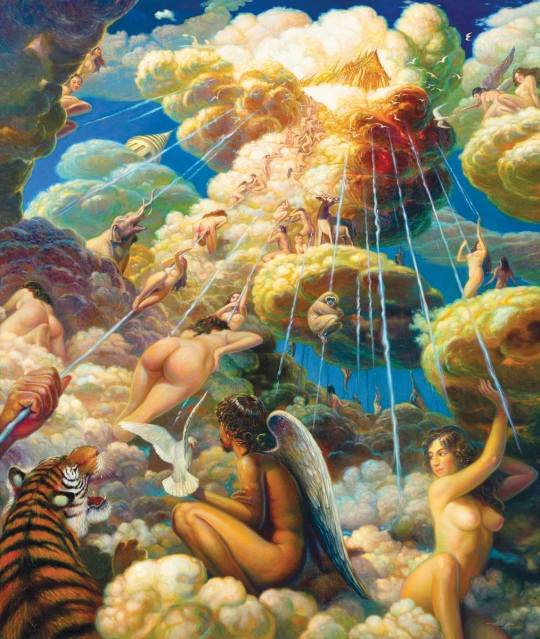
Way to Heaven by Prateep Kochabu
“when all desires that lodged in the heart are let go, the mortal becomes immortal and reaches the Eternal.”
Brihad Aranyaka Upanishad
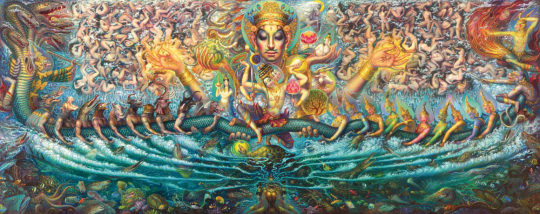
Churning of the Milk Ocean (2010)
Prateep reinterprets the Hindu cosmogenic scene, with the deva antigods presented in a rainbow of radiant colours and the asura gods pictured as animal-headed composites-but both of which are all male-in a tug-of-war over Vāsuki the multi-headed naga as though struggling over the roiling whirlpool of females churning above.
2 notes
·
View notes
Text
Brihad aranyaka upanishad further explanation
Brihad aranyaka upanishad further explanation
Note :In this post i am talking about the last part of brihadaranyaka upanishad, thus ends the brhidarayaka upnishad, though let us discuss the practical importance of the above subject as a whole on the shastras, on one hand it talking about the creation of the universe and destruction of the universe. It talks about the micro and macro cosmic enrgyl levels. Touching upon the subjects of…
View On WordPress
0 notes
Text
" «No hay sino un Dios, el Padre infinito [1 Corintios 8:6], quien también es un Creador fiel [1 Pedro 4:19]. El Creador divino es también el Ordenador Universal [Atharva Veda 13.4.3,12,20], la fuente y destino de las almas [Brihad-Aranyaka Upanishad 3.9.1,10]. Él es el Alma Suprema [Bhagarata Purana 11.18.32], la Mente Primordial [Bhagavad Gita 10.12,13,1,16], y el Espíritu Ilimitado de toda la creación [Vishnu Purana 1.1.35]. El Gran Controlador no comete errores [Shi Jing 3.3.3.12.8-10]. Él resplandece en majestad y gloria [Corán 57:3]. Dios el Creador está completamente exento de temor y enemistad. Es inmortal, eterno, existente por sí mismo, divino y magnánimo [Japji, preámbulo]. ¡Cuán puro y hermoso, cuán profundo e insondable es el excelso Antecesor de todas las cosas! [Tao-Te-King 4.2,1] El Infinito es más excelente por lo que él se imparte a sí mismo a los hombres [Tao-Te-King 41,3]. Es el principio y el fin, el Padre de todo propósito bueno y perfecto [Yasna 31.8]. Con Dios todas las cosas son posibles [Mat. 19:26]; el Creador eterno es la causa de las causas [Vishnu Purana 1.1.35].»[32]"
Fundación Urantia, (ed. 1999). Libro de Urantia, La naturaleza de Dios. Estados Unidos. p. 34 §1. ISBN 978-1-883395-02-5
0 notes
Text
Revival of Vedic Cult And jibankrishna or Diamond
Revival of Vedic Cult And jibankrishna or Diamond
This living human being is the Truth – Jibankrishna’s forecast
June 19, 1960.
Diamond discussed:
See, what an amazing phenomenon is happening here! Imagine how many years back these Upanishads were written. In Brihad Aranyaka Upanishad Rishi (Sage) Jagyabalka is saying in one place – ‘Those who worship anything except himself is like a sacrificial animal for the…
View On WordPress
0 notes
Photo

Bhagavad Gita Chapter 9 Verse 6 - TemplePurohit.com yathākāśa-sthito nityaḿ vāyuḥ sarvatra-go mahān tathā sarvāṇi bhūtāni mat-sthānīty upadhāraya Word Meanings: yathā — just as; ākāśa-sthitaḥ — situated in the sky; nityam — always; vāyuḥ — the wind; sarvatra-gaḥ — blowing everywhere; mahān — great; tathā — similarly; sarvāṇi bhūtāni — all created beings; mat-sthāni — situated in Me; iti — thus; upadhāraya — try to understand. Explanation: For the ordinary person it is almost inconceivable how the huge material creation is resting in Him. But the Lord is giving an example which may help us to understand. The sky may be the biggest manifestation we can conceive. And in that sky the wind or air is the biggest manifestation in the cosmic world. The movement of the air influences the movements of everything. But although the wind is great, it is still situated within the sky; the wind is not beyond the sky. Similarly, all the wonderful cosmic manifestations are existing by the supreme will of God, and all of them are subordinate to that supreme will. As we generally say, not a blade of grass moves without the will of the Supreme Personality of Godhead. Thus everything is moving under His will: by His will everything is being created, everything is being maintained, and everything is being annihilated. Still He is aloof from everything, as the sky is always aloof from the activities of the wind. In the Upanishads it is stated, yad-bhisa vatah pavate: “It is out of the fear of the Supreme Lord that the wind is blowing.” (Taittiriya Upanishad 2.8.1) In the Brihad-aranyaka Upanishad (3.8.9) it is stated, etasya va aksharasya prasasane gargi surya-candramasau vidhrtau tisthata etasya va aksharasya prasasane gargi dyav-aprithivyau vidhrtau tisthatah. “By the supreme order, under the superintendence of the Supreme Personality of Godhead, the moon, the sun, and the other great planets are moving.” In the Brahma-samhita (5.52) also it is stated, yac-caksur esa savita sakala-grahanam raja samasta-sura-murtir asesa-tejah yasyajnaya bhramati sambhrta-kala-cakro govindam adi-purusham tam aham bhajami This is a description of the movement of the sun. It is said that the sun is considered to be one of the eyes of the Supreme Lord and that it has immense potency to diffuse heat and light. Still it is moving in its prescribed orbit by the order and the supreme will of Govinda. So, from the Vedic literature we can find evidence that this material manifestation, which appears to us to be very wonderful and great, is under the complete control of the Supreme Personality of Godhead. This will be further explained in the later verses of this chapter. https://ift.tt/2YQvjo7
1 note
·
View note
